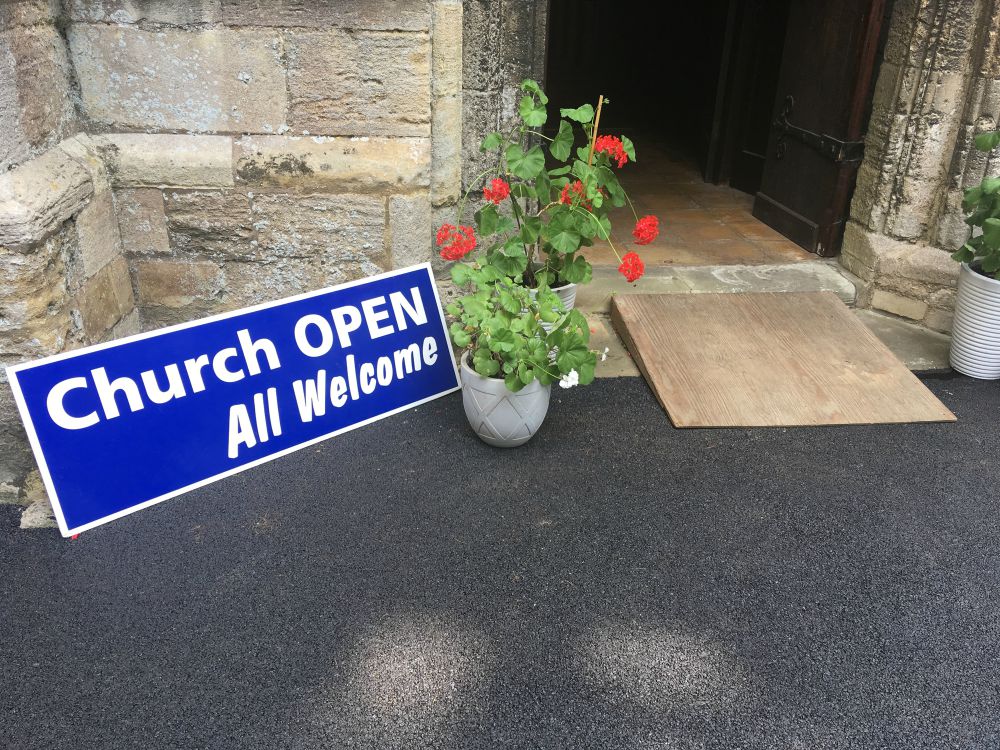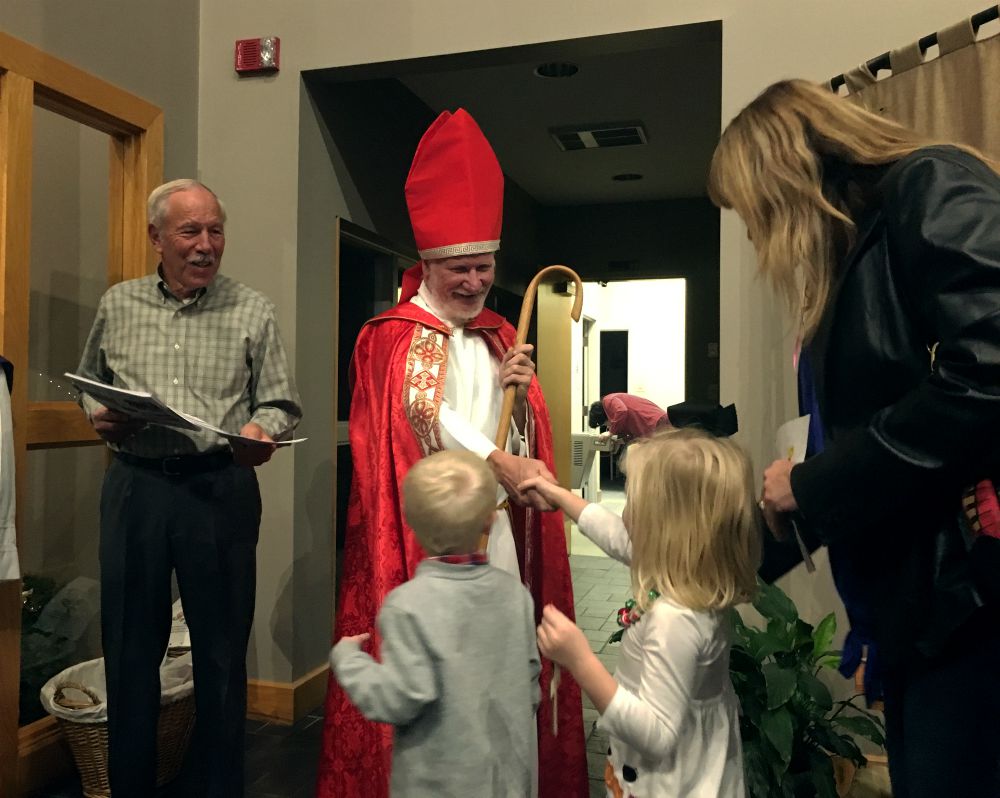
Parish buildings and meeting rooms change, but a field hospital is set up in a distinct space with a distinct purpose, a purpose that cannot be realized unless it is open and unless people are invited in. (Dreamstime/Eagl1e)
Missionary creativity. That two-word phrase has been employed by Pope Francis twice in official documents, Evangelii Gaudium, paragraph 28, and Amoris Laetitia, paragraph 57, published a few years later. Evangelii Gaudium best fleshes out what Francis has in mind, stating:
The parish is not an outdated institution; precisely because it possesses great flexibility, it can assume quite different contours depending on the openness and missionary creativity of the pastor and the community. While certainly not the only institution which evangelizes, if the parish proves capable of self-renewal and constant adaptivity, it continues to be "the Church living in the midst of the homes of her sons and daughters." (#28)
I happen to like the current occupant of the Chair of St. Peter more often than not, yet when I come across these words of the pope I grumble, "Oh, Francis, if only you knew. …" I'm not an anti-Frank sort of Catholic, but to say the parish possesses great flexibility and possess missionary creativity does not strike me as an accurate assessment of most experiences I have had in parishes. And yes, I am but one person, in but one corner of this country, and so I know that my sample size is not scientifically valid. I am confident enough in what I have seen — and not seen — in parishes I have been involved with either as a parishioner, a guest or observer of thousands of bulletins thanks to my time at J.S. Paluch, Inc. to offer my own suggestions on how a parish can have missionary creativity and thus be a "church alive."
So let's talk about ways to be creative and missionary at our parishes. These are ideas that I think are pretty transferable but the practicality depends on the flavor of the parish community (priest, parishioner, staff and general community).
1. Let's start with your parish parking lot
Not every parish has a parking lot, and those that do may wish they had more space, but we're talking about missionary creativity with fidelity to the message of Christ, and so I think that at least two parking spaces near the entrance should have signs that read "Guests / Visitors" and another two spaces should be dedicated to "Expectant Mothers or Parents with Infants." After all we are to welcome the stranger, or, as the Benedictines say, when a guest comes Christ comes. This is an outward sign of welcome and putting the Gospel into practice at a parish.
2. Confessionals and monstrances need not collect dust
Francis himself speaks often of the need to go to confession, so please stop having confession for 30 minutes or even just 15 minutes once a week on a Saturday afternoon and/or by appointment. I don't want to make an appointment, so the one time I went this year was when I was in downtown Chicago and the confessionals at St. Peter's are open 8-plus hours per day. In fact, for Lent, why not open your doors for 24 hours straight with the option of confession during that time? That would be difficult, but I contend a nice offset to the 15-minute alternative. Also, even if adoration isn't your preferred method of prayer, I have been around enough parishes in diverse geographies or neighborhoods to conclude that some, perhaps many, young people greatly appreciate and show up to adoration, particularly in the evenings.
3. Are there homeless persons in your town?
Two things come to mind. The easier option is to have a Mass for the homeless. If the Eucharist is the source and summit of our Christian lives, and we say we care for the poor, we should meld those two things together and offer a Mass for the homeless — and — actively welcome them to Mass and dinner afterwards. The second option which some might dismiss as logistically impossible: Staff your sanctuary a few nights each week and allow the homeless the ability to come in and keep warm (or cool) or even sleep in the church. This is not the only way to shelter the homeless, but it's a pretty direct way, especially if there are families at your parish and you want children to actually see ones faith lived out by their faith community.
Advertisement
4. What are your strengths (self-renewal) / who is your community (adaptivity)?
In extoling parishes as hubs of missionary creativity, Pope Francis hinges that moniker on the ability of the parish (pastor and flock) to engage in self-renewal and adaptivity. I was once invited to partake in a parish renewal that was necessitated when a long-time pastor was asked to leave, but did not go quietly into the night, and many parishioners followed him. I don't think we did anything Earth-shattering, but we did do three things, two of which Francis spoke about: one, self-renewal to see what the parish's strengths were and that included the strengths of the pastor and regular Mass attendees; two, an assessment of our neighborhood/community within the parish boundaries (what did the community need and what could we provide?); and, three, we used the language of "service and sacraments" together because we knew we were about the liturgy and service, faith and works, Christ's death and his resurrection. From that process a parish food pantry was started. You don't have to do a formal SWOT (strengths, weaknesses, opportunities and threats) analysis, but you could bring in a facilitator. Doing so can build community, trust, friendships, new ministries and recommitment. You may also discover there are marginalized persons that you as a parish could do something for.
5. Homilies and liturgy
It would be dishonest of me to say I don't have my own preferences in liturgy; I do, but honest to God, at this point I almost don't care because my concern now is "execution." I don't care if the Communion song is "Pange Lingua" (known by its last stanza, tantum ergo) on the organ or "On Eagle's Wings" on guitar — so long as it is played well. I don't care if the servers are boys or girls, so long as they know what to do and show reverence; I don't care who the reader is, so long as they practiced. And a priest has wide latitude on what he wants to preach, but, good heavens, I don't care how poorly you played on the back nine or how great your last trip was, especially if there is no tie-in to the Scripture readings.
My point is this: I've gone to far too many Masses that are just awkward, disjunct and inhibitive of prayer. And I know they're bad because I've gone to beautiful Masses and heard wonderful homilies (sometimes by the same priest or parish, just on different Sundays). There's something to be said for consistency, and if we lose sight of the mission, then missionary creativity is meaningless. And when it comes to liturgical creativity within the Mass, then the maxim attributed to Saint Gregory, "everything in moderation," comes to mind. However, if there are multiple parishes in a 10-mile radius, perhaps they should not all have the same Mass times.
6. Your digital footprint
Your parish needs a website, it needs a Facebook page and, most importantly, those need to be updated regularly. Not to be stereotypical, but find a teenager or young adult you want to involve, sit them down for 30 minutes, go over a page-long list of do's and don'ts online, give them some resources, from the USCCB on down to Word on Fire, if you like, and tell them to make five posting a week plus a reminder of Mass times. Don't have a young adult willing? Ask your parish bulletin printing company what services they can offer you — for free — online.

Young parishioners shake hands Dec. 2 with an actor portraying St. Nicholas, the namesake of their church. St. Nicholas Catholic Church in Santa Claus, Indiana, hosted the visit from "St. Nick" ahead of the saint's feast day, Dec. 6. (CNS/KatieRutter)
7. Let's talk about (signs of the) time and culture
Why are you scheduling activities during Mass times? What activities are you scheduling? For instance, did your parish host a breakfast with Santa? If so, did he look like Kris Kringle a la "Miracle on 34th Street," or do you have someone look like Saint Nicholas, Bishop of Myra? Catechesis and evangelization is not simply in the sanctuary or in 90 minutes of CCD (catechism class). It's hard to talk about being counter-cultural if our own parishes are furthering the culture we propose to counter.
8. The rod and splinter test
The rod and splinter test is a charitable way of saying, "How wide is the space between our words and actions?" a.k.a. the hypocrite test. Starting simply and literally, does your sign or bulletin say you're "welcoming"? If so, do you actually have folks, ushers or greeters who are friendly and who welcome people to church or to events, and do those folks enjoy welcoming people, or is there nary a smile as people first come into your space?
Do you have a social justice or pro-life group? If so, does your faith community act out a concern for human life, or is it just talk? If you care about mothers, the elderly, the marginalized, do you have dedicated parking spaces, a parish scholarship for adoptive parents, babysitters at certain events, outreach programs, parishioners who could impart their business/work wisdom with others through resume writing or events meant for community building?
When you get down to it, missionary creativity is about ministry and ministry has two innate components: space and relationships. Those who would divorce the intertwined reality of space and relationships are ignorant to or fail to grasp that which the church is about. Yes parish buildings and meeting rooms change, but a field hospital is set up in a distinct space with a distinct purpose, a purpose that cannot be realized unless it is open and unless people are invited in.
Missionary creativity and integrity of mission is achieved, when we honor the relationships and purposes of a space — from visitor to bishop and from the beautiful sanctuary to the buckling parking lot. For the sake of fidelity and integrity, if my parish asks me to believe in the Gospel and follow Jesus Christ, I think I can ask the same of my parish. So let's get creative.
[Mark Piper, a Packers fan in an unholy land, works in the nonprofit sector. He resides in Chicago with his family and holds a master's in public policy from DePaul University and a bachelor's from Saint Xavier University; he is an alumus of Amate House, an AmeriCorps-approved year of service organization sponsored by the Chicago Archdiocese.]
Editor's note: We can send you an email alert every time a Young Voices column is posted to NCRonline.org. Go to this page and follow directions: Email alert sign-up.







